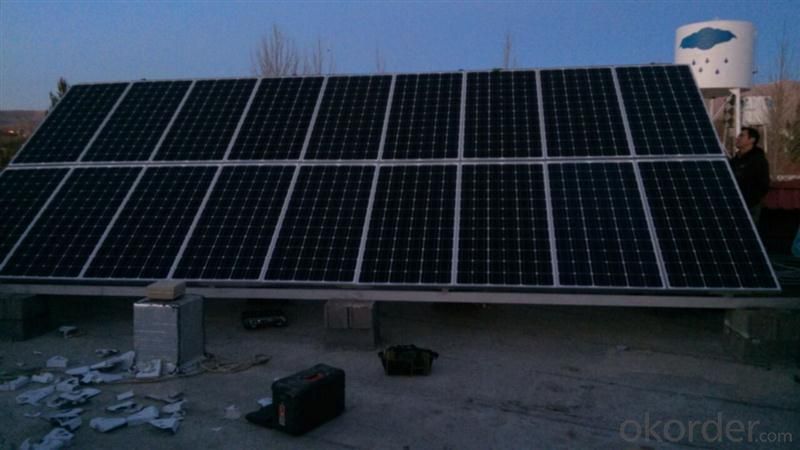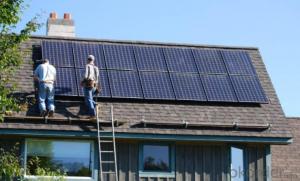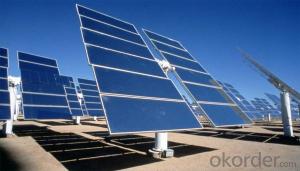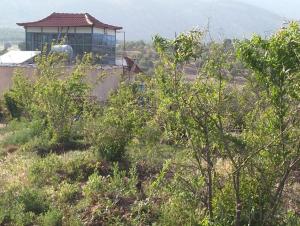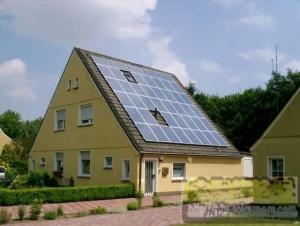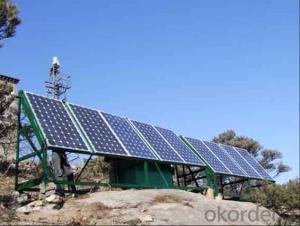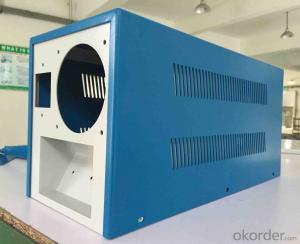Off-Grid Solar Power System 1.5KW High Efficiency
- Loading Port:
- China main port
- Payment Terms:
- TT OR LC
- Min Order Qty:
- 1 pc
- Supply Capability:
- 10000 pc/month
OKorder Service Pledge
OKorder Financial Service
You Might Also Like
1.Description of Product
Off-Grid Solar Power System is consisted of solar panel, solar charge controller, inverter, battery, mounting rack and cables.
(1).Grid-connected, send power to city grid
(2).MPPT technology, wide range of working voltage
(3).Simply Wiring, easy installation, customized design for your projects
(4).Low investment & long term feedback
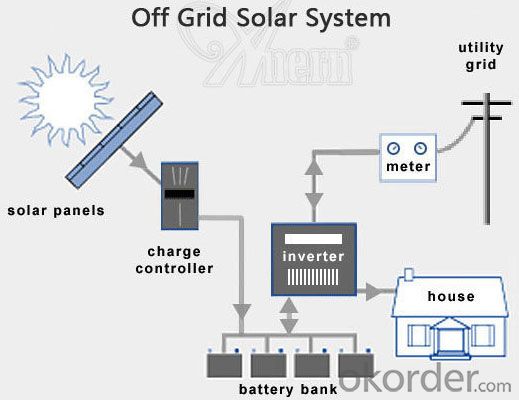
2. Off-Grid Features
1. Off grid solar power system is mainly used for application with relatively-small power consumption, and the areas have no grid network coverage, or grid power is unstable or outage condition.
2. It’s composed of solar panels, hybrid solar inverter, battery bank, solar panel mounting racks, and other accessories required fora complete home solar power system.
3. The battery bank gives a stable power output to the solar inverter which converts DC to AC to power loads, and provides power backup in rainy or cloudy days.
4. The solar panels generate electricity at daytime and charge the battery bank .
5. The off grid home solar power system provides grid power bypass in case of battery power shortage when sunshine is not enough.
6. All the off grid home solar power system configurations are worked out by scientific calculation and design.
The Product Parameter | |
Ref No. | 1.5KW |
Solar Panel | Type: Monocrystalline Silicon PV Module Max Power: 250W QTY:4 pcs |
Controller-Inverter Integrator | Rated Ouput Power: 1500W Rated DC Voltage: 48V QTY:1 pcs |
Battery | 12V/200AH per piece QTY:4 pcs |
Solar Panel Rack | Roof type mounting rack, anodized aluminum material, including complete fittings (Other type of racks can be customized as per client's requirement) QTY:1 pcs |
Cables | International standard, with specification suitable for solar system, RVV2*6 QTY:30m |
3.The Pictures of Product
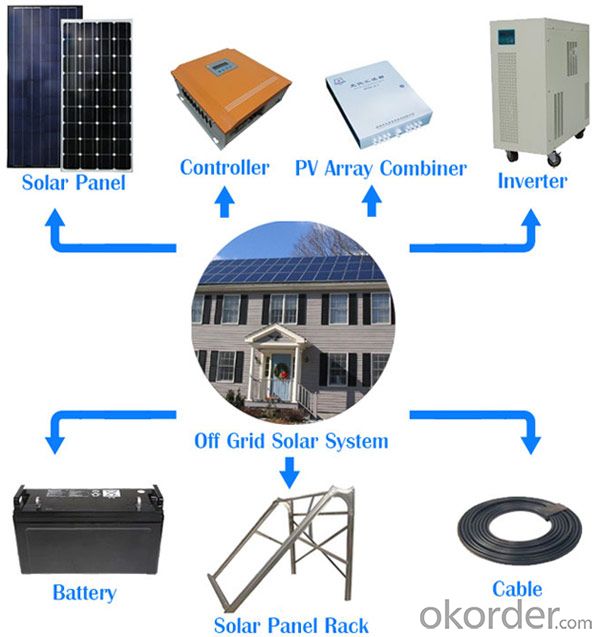
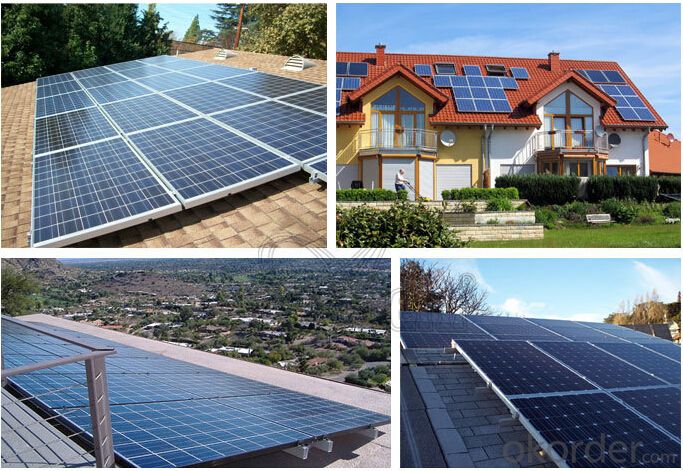
4.FAQ
Q1: What is the business type for the company?
A1: We are one of the biggest manufacturers inBejing.Chnia. Which is a high tech PV enterprise dedicated to the research, development, production and sales..
Q2: How long solar panel warranty can you offer?
A2: 10-Year product warranty,25-year linear power output warranty
If there is any quality problem, we will pay for freight and send free parts to you.
Q3: How many certificates do you have?
A3: We have 16 certificates,such as CE, TUV, UL, and so on.
Q4: Can I be the agent for you?
A4: Yes,We can discuss some information.
Q5: How to get a sample?How can cooperation with us
A5: contact us now.
- Q: How does the efficiency of solar panels vary with temperature?
- The efficiency of solar panels varies inversely with temperature. As the temperature increases, the efficiency of solar panels decreases. This is because solar panels work by converting sunlight into electricity through the photovoltaic effect. When the temperature rises, the electrons in the solar cells gain more energy, which can lead to an increase in electron movement and resistance within the panel. The efficiency of solar panels is typically measured by their power output in relation to the amount of sunlight received. As the temperature rises, the power output of solar panels tends to decrease, resulting in reduced efficiency. This decrease in efficiency is known as the temperature coefficient. The temperature coefficient represents the percentage change in power output for every degree Celsius increase in temperature. It is usually expressed as a negative value, indicating the decrease in efficiency as the temperature rises. Different types of solar panels have different temperature coefficients, which can range from -0.2% to -0.5% per degree Celsius. To counter the decrease in efficiency caused by higher temperatures, solar panels are often designed with cooling mechanisms or placed in locations with good ventilation. These measures help dissipate excess heat and maintain a more favorable operating temperature, thereby improving the overall efficiency of the solar panels. In summary, the efficiency of solar panels decreases with increasing temperature due to the temperature coefficient. It is important to consider temperature effects when designing solar panel systems and implement measures to mitigate the decrease in efficiency caused by higher temperatures.
- Q: How do solar energy systems affect roof maintenance?
- Solar energy systems can potentially affect roof maintenance in a few ways. Firstly, the installation of solar panels requires drilling holes into the roof, which may cause some damage to the shingles or roofing material. However, reputable installers take precautions to minimize any potential damage. Additionally, solar panels can act as a protective layer, shielding the roof from harsh weather conditions, such as sun exposure, hail, or heavy rainfall, which can extend the lifespan of the roof. However, it is important to regularly inspect the roof to ensure that any debris or dirt does not accumulate between the panels and the roof, as this can lead to potential roof damage or leaks. Overall, while there may be some initial impact during installation, solar energy systems generally have a positive effect on roof maintenance by providing protection and potentially prolonging the roof's lifespan.
- Q: Can a solar energy system be installed on a concrete roof?
- Certainly! Solar energy systems can indeed be installed on concrete roofs. Concrete roofs are actually considered one of the best surfaces for installing solar panels. They are usually flat, stable, and long-lasting, making them an excellent base for the panels. Moreover, concrete roofs often have plenty of space and are not hindered by nearby trees or buildings, which allows for optimal sunlight exposure. To install the panels on a concrete roof, special mounting systems are used to securely attach them and withstand their weight. All in all, concrete roofs are a superb option for installing a solar energy system.
- Q: What is the impact of temperature on the efficiency of a solar energy system?
- The efficiency of a solar energy system is significantly impacted by temperature. As the temperature increases, the efficiency of solar panels decreases. This is due to the behavior of the semiconductor materials used in solar cells. When solar panels are exposed to sunlight, they absorb photons and convert them into electricity. However, as the temperature rises, the resistance of the semiconductor material increases, leading to a decrease in the flow of current. This phenomenon is known as the temperature coefficient of power. The temperature coefficient of power is usually expressed as a percentage per degree Celsius and varies depending on the type of solar panel technology. Most solar panels have a negative temperature coefficient, meaning their efficiency decreases as the temperature rises. On average, the efficiency of solar panels can decrease by around 0.5% to 0.8% per degree Celsius increase in temperature. Additionally, increased temperatures can also cause thermal losses within the system. Heat can build up within the solar panels, reducing their efficiency further. This is especially true in hot climates or during periods of high solar irradiance. To mitigate the impact of temperature on solar energy system efficiency, various strategies can be employed. One common method is to incorporate cooling mechanisms, such as ventilation or water circulation, to dissipate the excess heat generated by the solar panels. This helps maintain lower operating temperatures and consequently improves the overall efficiency. Furthermore, proper system design and installation techniques can also help minimize temperature-related losses. For example, mounting solar panels with sufficient spacing to allow for air circulation can prevent overheating. Additionally, selecting solar panels with lower temperature coefficients can help mitigate efficiency losses in high-temperature environments. In conclusion, temperature has a significant impact on the efficiency of a solar energy system. Higher temperatures can cause a decrease in the efficiency of solar panels, primarily due to increased resistance in the semiconductor materials. To optimize the performance of solar energy systems, strategies such as cooling mechanisms and proper system design should be implemented.
- Q: What is the impact of saltwater spray on solar panels?
- Saltwater spray can have several impacts on solar panels. Firstly, the salt in the spray can create a layer of residue on the surface of the panels, which can reduce their overall efficiency. This residue acts as a barrier, preventing sunlight from reaching the photovoltaic cells and reducing the amount of electricity that can be generated. Secondly, the corrosive nature of saltwater can lead to the degradation of the materials used in solar panels. Over time, the salt can cause the metal components and connections in the panels to corrode and weaken, potentially leading to malfunctions or even complete failure of the panels. Additionally, saltwater spray can also affect the structural integrity of the panels. The constant exposure to saltwater can cause the materials to deteriorate, leading to cracks, warping, or other forms of physical damage. This can not only impair the performance of the panels but also pose safety risks. To mitigate the impact of saltwater spray on solar panels, it is essential to regularly clean and maintain them. This involves removing the salt residue and ensuring that the panels are free from any accumulated debris. Proper cleaning techniques and regular inspections can help prolong the lifespan of the panels and maintain their efficiency. Furthermore, selecting solar panels specifically designed for coastal or marine environments can provide added protection against saltwater spray. These panels are often constructed with materials that are more resistant to corrosion and have enhanced durability to withstand the harsh conditions. In conclusion, saltwater spray can have a negative impact on solar panels by reducing their efficiency, corroding their components, and compromising their structural integrity. However, with proper maintenance and the use of suitable panels, these effects can be minimized, allowing solar energy systems to continue operating effectively even in coastal or marine environments.
- Q: What are the key components of a solar energy system?
- The key components of a solar energy system include solar panels, an inverter, a mounting system, batteries (optional), and a monitoring system.
- Q: Can solar energy be used in cloudy climates?
- Yes, solar energy can still be used in cloudy climates, although the efficiency may be reduced. Solar panels can still generate electricity even with limited sunlight, although the output will be lower compared to sunny conditions. Additionally, advancements in solar technology and the use of tracking systems can help optimize energy production in cloudy environments.
- Q: What is the lifespan of solar panels?
- The average lifespan of solar panels is around 25 to 30 years, although many panels can continue to produce electricity for even longer with proper maintenance and care.
- Q: How do solar energy systems affect the electrical wiring of a building?
- Solar energy systems can have an impact on the electrical wiring of a building. When solar panels are installed, they need to be connected to the existing electrical system. This typically involves adding a new electrical panel or inverter to convert the DC power from the solar panels to AC power that can be used in the building. Additionally, solar energy systems may require the installation of new wiring to connect the panels to the electrical panel. However, with proper installation and integration, solar energy systems should not negatively affect the electrical wiring of a building.
- Q: How does the temperature affect the performance of solar panels?
- The temperature has a direct impact on the performance of solar panels. Generally, higher temperatures can cause a decrease in the efficiency of solar panels. This is because as the temperature rises, the electrical conductivity of the materials used in the panels decreases, leading to a reduction in the conversion of sunlight into electricity. Additionally, higher temperatures can increase the resistance within the solar cells, resulting in a decrease in the overall power output. However, it is important to note that solar panels are designed to tolerate a wide range of temperatures and their performance can still be significant even in hot weather.
Send your message to us
Off-Grid Solar Power System 1.5KW High Efficiency
- Loading Port:
- China main port
- Payment Terms:
- TT OR LC
- Min Order Qty:
- 1 pc
- Supply Capability:
- 10000 pc/month
OKorder Service Pledge
OKorder Financial Service
Similar products
Hot products
Hot Searches
Related keywords



